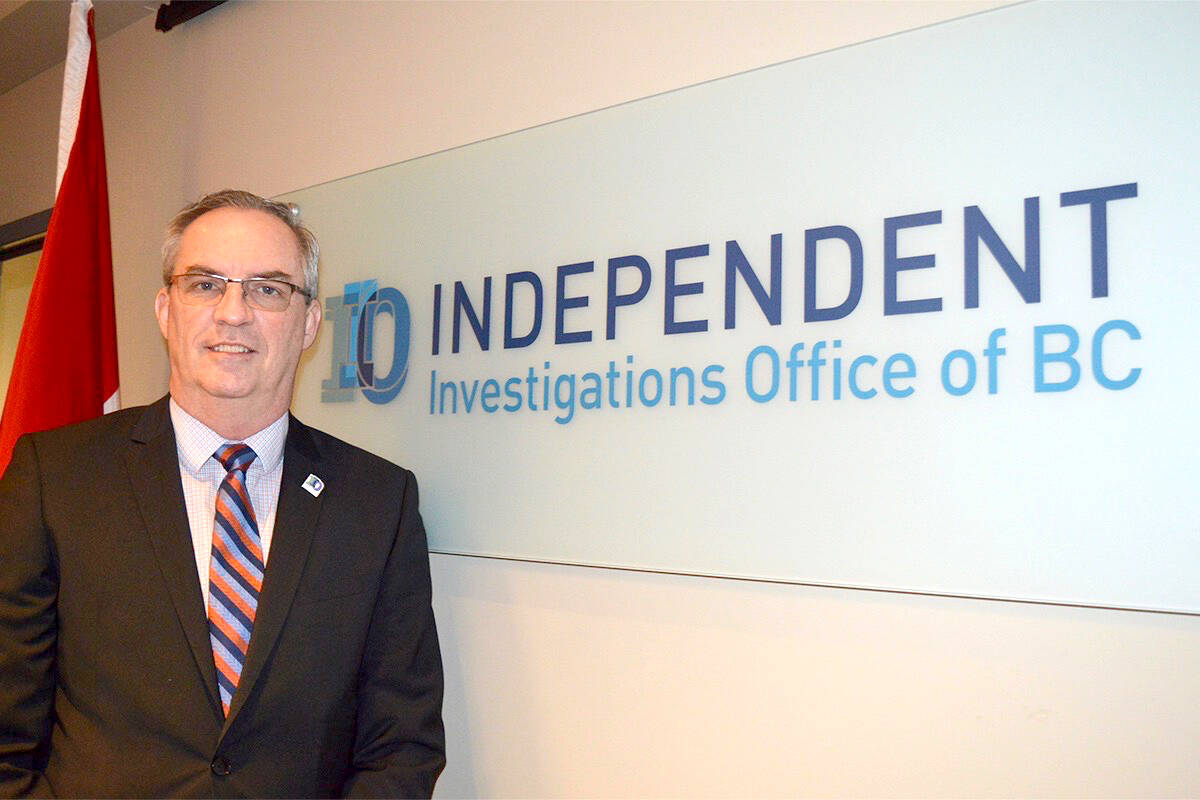The head of B.C.’s police watchdog will be celebrating his 65th birthday on Wednesday (May 8) by concluding his career.
After six-and-a-half years as the chief civilian director of the Independent Investigations Office of B.C., during which he oversaw close to 1,200 investigations into potential police misconduct, Ronald MacDonald is retiring.
“It’ll be odd,” he said in an interview with Black Press Media on Tuesday. “But, as I said to my wife yesterday, I have no uncertainties about my decision. It is definitely time.”
MacDonald took on the role in October 2017 after moving from his home province of Nova Scotia, where he worked as director of the Serious Incident Response Team – the equivalent of the IIO – and as a lawyer for more than 30 years before that.
“Police oversight is a fundamental pillar in a democratic society,” MacDonald said in a statement at the time.
The function of the IIO is to investigate any police-involved incident that results in serious harm or death. The office examines what role officers’ actions or inactions played in the incident, and can recommend criminal charges to Crown counsel.
Six-and-a-half years after starting at the office, MacDonald said his belief in the necessity of its work has not changed. But his desire to lead it has.
“You know, whenever we make a decision, there’s someone who disagrees with us. And it does take a toll over time and that’s why one shouldn’t do this job too long. And I’m at the verge of that, so it’s time to move on.”
MacDonald said the nature of the job is that they’re always upsetting someone. Either they’re telling a family that they won’t be pursuing things further in the case of their loved one, or they’re informing police officers that they are recommending criminal charges against them.
Those conversations are generally the most challenging part of the job, MacDonald said. But something else that has been weighing on him is the lack of referred cases that Crown counsel is actually pressing charges on.
In the last five years, MacDonald said his office has recommended criminal charges against officers in 39 cases. Crown counsel has pressed charges in just 18 of those.
Most recently, the B.C. Prosecution Service declined to pursue charges last month against three officers involved in the 2021 shooting death of Wet’suwet’en man Jared ‘Jay’ Lowndes. In its own report, the IIO stated there were “reasonable grounds” to consider charges against the officers, but Crown concluded that there wasn’t enough evidence.
MacDonald said there have also been 15 times since the IIO’s inception in 2012 that charges were approved against police officers, but that they disputed them and were never convicted.
“Those numbers raise questions that need to be addressed,” MacDonald said. “I think there are definitely challenges to the accountability of police in British Columbia.”
He said he’s expressed his concerns to B.C.’s attorney general and has been told they are being looked into.
READ ALSO: Watchdog wants B.C. to probe lack of prosecutions in police use of force
READ ALSO: Crown rejects charges in B.C. police shooting because of lack of evidence
Another area MacDonald said B.C.’s justice system needs to continue work on is in its relationships with Indigenous communities. He said perhaps the biggest thing he is taking away from his time at the IIO is the need to build trust with Indigenous people and groups and accommodate their history and viewpoints.
It’s something he said he plans to speak out on in retirement.
Besides that, MacDonald intends to do some oversight consulting work and public advocacy, perhaps dip his toes back into criminal law, and share his views on the importance of transparency in communication and media relations.
It won’t be all work and no fun, though. MacDonald said he’s excited to start doing some screenwriting based off of the experiences he’s had and the people he’s met over his career.
“It would be fiction. But, as with anything anybody writes, there’s always elements of truth to it.”
And, MacDonald is leaving B.C. behind.
On Friday, he’ll be packing up the last of his belongings from his Surrey home and hitting the road to drive across the country for the first time in his life and move back to Nova Scotia. MacDonald said he’ll be settling down with his wife in a lakeside house located just outside of Halifax, and across the street from one of his four children.
“My journey of discovery in life is still ongoing and I think I’m wonderfully lucky.”
MacDonald said he wants to thank British Columbians for accepting him in the role of chief civilian director and challenging him to be his best. He said if there is any parting advice he can offer, it is the same thing as what he tells his investigators every day: to always search for the truth.
MacDonald’s role will be temporarily filled by the IIO’s chief operating officer, Sandra Hentzen.
“I leave the IIO in Sandra’s capable hands. Having had the pleasure of working with Sandra since my arrival at the IIO in 2017, I have found her to be an exceptionally strong people leader and mentor, and she has demonstrated qualities essential for the CCD, including courage and collaboration, which make her well-suited to maintaining the public’s trust,” MacDonald said in a statement.
Hentzen has been COO of the IIO since August 2018, before which she served as a consultant with the office for two years. Prior to the IIO, she was the executive vice president of human resources at TransLink.
“I look forward to serving the public in this capacity and continuing both to deliver on the IIO mandate and further some of the essential projects our office has underway,” Hentzen said.
A new chief civilian director is expected to be appointed by the province in the coming months. The IIO has existed in B.C. since 2012.
READ ALSO: Kelowna RCMP officer ‘likely crossed criminal negligence threshold’: IIO

